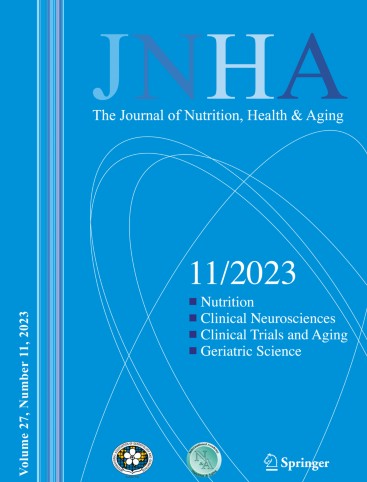Adherence to the Japanese Diet is Associated with Lower Risk of Geriatric Depression: A Prospective-Cohort Study Based on the New Integrated Suburban Seniority Investigation (NISSIN) Project
IF 4
3区 医学
Q1 GERIATRICS & GERONTOLOGY
引用次数: 0
Abstract
Objectives
Geriatric depression is an increasingly important public health issue in an aging society. However, while Japan boasts one of the world’s highest and healthiest life expectancies at birth, there was no prospective cohort study dedicated to the specific association between the Japanese diet and geriatric depression. Thus, we aimed to examine this relationship and assess whether such association extends beyond better physical health secondary to higher diet quality.
Design, setting, participants, and measurements
Our study utilized the New Integrated Suburban Seniority Investigation (NISSIN) Project, which is an age-specific prospective cohort study that recruited residents of Nisshin City, Japan who were about to reach 65 years of age between 1996 and 2005. We measured the adherence to the Japanese diet of 1620 elderly Japanese individuals (827 male and 793 female) with a modified version of the Japanese Diet Index (JDI) and assessed the development of geriatric depression with the Geriatric Depression Scale 15 items questionnaire when they reached 70 years of age.
Results
A total of 135 individuals developed geriatric depression at 70 years of age. After adjusting for major confounding factors, those within the highest group of adherence to the Japanese diet had significantly reduced risk of developing geriatric depression (adjusted odds ratio [aOR] = 0.525, 95% confidence interval [CI]: 0.286 – 0.962) when compared to those with the lowest adherence, and each point received on the JDI was also associated with reduced risk of geriatric depression (aOR = 0.900, 95% CI: 0.816−0.992). Dietary item-wise analyses showed that fish and shellfish (p = 0.024), green-yellow vegetable (p = 0.003), and soybean-derived products (p = 0.001) were significantly associated with lower risk of geriatric depression.
Conclusion
Adherence to the Japanese diet, especially those rich in green-yellow vegetables, soybean-derived products, and fish and shellfish, may be protective against geriatric depression.
坚持日本饮食与降低老年抑郁症风险相关:一项基于新综合郊区年资调查(nisin)项目的前瞻性队列研究。
目的:老年抑郁症是老龄化社会日益重要的公共卫生问题。然而,尽管日本是世界上出生时预期寿命最高、最健康的国家之一,但没有一项前瞻性队列研究专门研究日本饮食与老年抑郁症之间的具体联系。因此,我们的目的是研究这种关系,并评估这种联系是否超出了更好的身体健康,其次是更高的饮食质量。设计、设置、参与者和测量:我们的研究利用了新综合郊区年事调查(nisin)项目,这是一项年龄特定的前瞻性队列研究,招募了1996年至2005年间日本日新市65岁以上的居民。采用修正版日本饮食指数(JDI)测量了1620名日本老年人(男性827名,女性793名)对日本饮食的依从性,并使用老年抑郁量表15项问卷评估了他们在70岁时的老年抑郁发展情况。结果:共有135人在70岁时患上老年抑郁症。在对主要混杂因素进行校正后,与依从性最低的组相比,坚持日本饮食的最高组患老年抑郁症的风险显著降低(调整优势比[aOR] = 0.525, 95%可信区间[CI]: 0.286 - 0.962), JDI的每一分也与降低老年抑郁症的风险相关(aOR = 0.900, 95% CI: 0.816-0.992)。饮食项目分析显示,鱼类和贝类(p = 0.024)、黄绿色蔬菜(p = 0.003)和大豆衍生产品(p = 0.001)与老年抑郁症风险降低显著相关。结论:坚持日本饮食,特别是那些富含黄绿色蔬菜、大豆制品、鱼类和贝类的饮食,可能对老年抑郁症有保护作用。
本文章由计算机程序翻译,如有差异,请以英文原文为准。
求助全文
约1分钟内获得全文
求助全文
来源期刊
CiteScore
7.80
自引率
3.40%
发文量
136
审稿时长
4-8 weeks
期刊介绍:
There is increasing scientific and clinical interest in the interactions of nutrition and health as part of the aging process. This interest is due to the important role that nutrition plays throughout the life span. This role affects the growth and development of the body during childhood, affects the risk of acute and chronic diseases, the maintenance of physiological processes and the biological process of aging. A major aim of "The Journal of Nutrition, Health & Aging" is to contribute to the improvement of knowledge regarding the relationships between nutrition and the aging process from birth to old age.

 求助内容:
求助内容: 应助结果提醒方式:
应助结果提醒方式:


